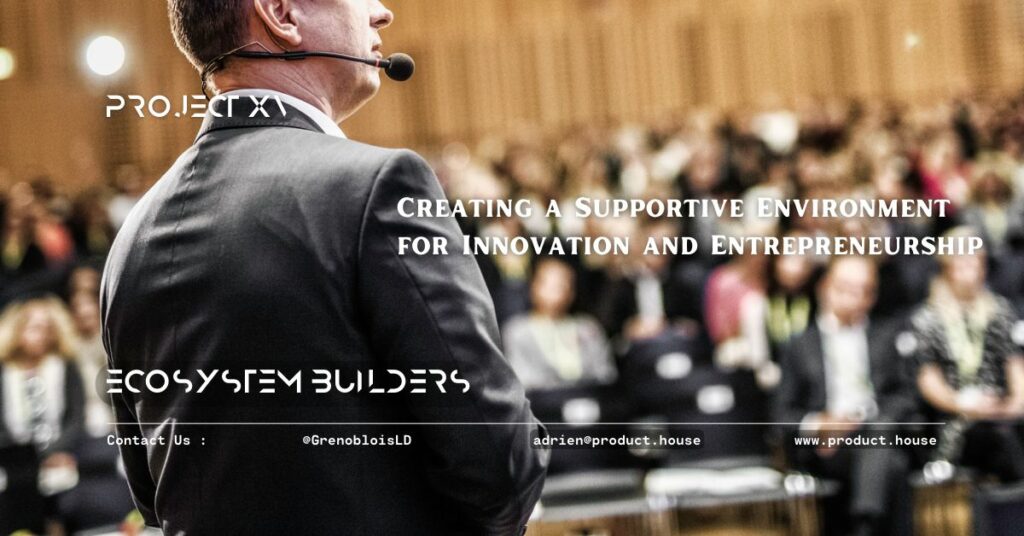Ecosystem Builders: Creating a Supportive Environment for Innovation and Entrepreneurship

Ecosystem builders are a group of individuals who work tirelessly to build and strengthen the entrepreneurial ecosystem of a region. They are responsible for connecting entrepreneurs with the necessary resources and support to help them succeed in their ventures.
Ecosystem builders also foster collaboration among various stakeholders to create an environment that is conducive to innovation, creativity, and growth.
1: The Role of Ecosystem Builders
Entrepreneurial ecosystems are made up of a diverse set of stakeholders, including entrepreneurs, investors, mentors, educators, policymakers, and support organizations. Ecosystem builders play a critical role in connecting these stakeholders and creating an environment that is conducive to innovation, creativity, and growth.
Ecosystem builders can be individuals, organizations, or networks that work to support the development of a regional entrepreneurial ecosystem. They can take on a variety of roles, including:
Connecting entrepreneurs with resources and support
They help entrepreneurs access the resources and support they need to succeed, including mentorship, funding, and business development services.
Fostering collaboration and partnerships
They bring together different stakeholders in the ecosystem to foster collaboration and partnerships. They help build relationships between entrepreneurs, investors, mentors, educators, policymakers, and support organizations.
Creating a supportive environment
They work to create an environment that is supportive of entrepreneurship and innovation. They advocate for policies and programs that encourage entrepreneurship and provide resources to help entrepreneurs succeed.
Nurturing startups from idea to exit
They provide a range of services to help startups grow and succeed, including incubation, acceleration, and mentorship.
Investing in entrepreneurship
And they can also be investors, providing capital to support startups and early-stage companies.
The role of ecosystem builders is particularly important in regions where entrepreneurship is not well established. In these regions, ecosystem builders can help create the necessary infrastructure to support entrepreneurs and attract outside investment.
Ecosystem building is not a one-size-fits-all approach. The needs of entrepreneurs and the ecosystem will vary depending on the region, the industry, and the stage of development. Builders need to be flexible and adaptable to the unique needs of their ecosystem.
Successful builders are passionate, dedicated, and collaborative. They understand the importance of building relationships and connecting stakeholders in the ecosystem. They are also committed to creating a supportive environment for entrepreneurship and innovation.
2: Creating a Supportive Environment
Entrepreneurs need access to resources and support to develop their ideas and grow their businesses. The builders play a key role in providing these resources and support services.
Here are some of these resources and support services:
Mentorship
Mentors can provide valuable guidance and advice to entrepreneurs as they develop their ideas and navigate the challenges of starting and growing a business. Ecosystem builders can help connect entrepreneurs with mentors who have relevant experience and expertise.
Funding
Access to capital is essential for startups and early-stage companies. Builders can help entrepreneurs access funding through venture capital firms, angel investors, crowdfunding, and other sources.
Business development services
Builders can provide a range of business development services to help entrepreneurs build their businesses, including legal, accounting, marketing, and product development services.
Networking opportunities
They can help entrepreneurs connect with potential partners, customers, and investors through networking events, conferences, and other forums.
Incubation and acceleration programs
Incubation and acceleration programs provide entrepreneurs with a range of services, including office space, mentorship, funding, and business development services.
Builders can also advocate for policies and programs that support entrepreneurship and innovation. These policies can include tax incentives for investors, streamlined regulations for startups, and investment in infrastructure and education.
3: Building Bridges between Communities
Entrepreneurial ecosystems often involve multiple communities, each with their own unique resources, strengths, and challenges. Building bridges between these communities is an important aspect of ecosystem building. It can help entrepreneurs access a wider range of resources and support services and create opportunities for collaboration and partnerships.
Building bridges between communities can be challenging, particularly when those communities have different cultures, languages, and ways of doing things. Builders can play a critical role in facilitating these connections and fostering collaboration and partnerships.
Here are some strategies:
- Engage with diverse stakeholders
- Build relationships
- Identify common goals and challenges
- Develop programs and services that serve multiple communities
- Provide translation and interpretation services
Building bridges between communities requires time, effort, and resources. However, the benefits can be significant.
4: Nurturing Startups from Idea to Exit
Builders can provide a range of services to help startups develop their ideas and grow their businesses. These services can include incubation, acceleration, and mentorship programs.
Here are some strategies that ecosystem builders can use to nurture startups:
- Incubation programs: Incubation programs provide startups with access to office space, mentorship, funding, and other resources to help them develop their ideas and build their businesses.
- Acceleration programs: Acceleration programs help startups scale their businesses more quickly by providing access to mentorship, funding, and other resources. These programs are often designed for startups that have already developed a product or service and are looking to grow.
- Mentorship: Mentors can provide valuable guidance and support to startups as they develop their ideas and grow their businesses. Ecosystem builders can connect startups with mentors who have relevant experience and expertise.
- Funding: Access to capital is essential for startups and early-stage companies. Ecosystem builders can help startups access funding through venture capital firms, angel investors, crowdfunding, and other sources.
- Business development services: Ecosystem builders can provide a range of business development services to help startups build their businesses, including legal, accounting, marketing, and product development services.
- Exit strategies: Ecosystem builders can also help startups develop exit strategies, such as mergers and acquisitions or initial public offerings. These strategies can help startups grow and scale their businesses and provide returns to investors.
Nurturing startups requires collaboration and partnership among stakeholders in the ecosystem. Ecosystem builders can work with entrepreneurs, investors, educators, policymakers, and support organizations to identify the needs of startups and develop strategies to address those needs.
In the following chapters, we will explore case studies and best practices from successful ecosystem building initiatives that have focused on nurturing startups.
5: Investing in Entrepreneurship
Investing in entrepreneurship is a critical aspect of ecosystem building. Ecosystem builders can be investors themselves or work to connect entrepreneurs with investors. The availability of capital is essential for startups and early-stage companies to grow and scale their businesses.
Here are some strategies that ecosystem builders can use to invest in entrepreneurship:
- Venture capital: Venture capital firms invest in startups and early-stage companies with high growth potential. Ecosystem builders can work to connect entrepreneurs with venture capital firms and provide support services to help startups prepare for and navigate the funding process.
- Angel investing: Angel investors are individuals who invest in startups and early-stage companies. Builders can work to connect entrepreneurs with angel investors and provide support services to help startups prepare for and navigate the funding process.
- Crowdfunding: Crowdfunding platforms allow entrepreneurs to raise funds from a large number of people. Builders can provide support services to help entrepreneurs prepare for and launch crowdfunding campaigns.
- Impact investing: Impact investors seek to generate social or environmental impact alongside financial returns. Builders can work to connect entrepreneurs with impact investors and provide support services to help startups prepare for and navigate the impact investing process.
6: Fostering a Culture of Innovation
Here are some strategies:
Education and training
Builders can provide education and training programs to help entrepreneurs develop the skills and knowledge they need to innovate. This can include programs on design thinking, creativity, and entrepreneurship.
Collaboration and partnerships
They can foster collaboration and partnerships among entrepreneurs, investors, educators, policymakers, and support organizations to create a more innovative ecosystem.
Support for experimentation
They also can provide resources and support to help entrepreneurs experiment and test new ideas. This can include access to prototyping facilities, mentorship, and funding.
Celebrating successes
They should not forget to celebrate and promote successful entrepreneurs and startups to create a culture of innovation and entrepreneurship.
7: Addressing Barriers to Entrepreneurship
Here are some of the barriers to entrepreneurship and strategies to surmount them:
Lack of access to capital
Access to capital is essential for startups and early-stage companies. Builders can work to connect entrepreneurs with funding sources and provide support services to help startups prepare for and navigate the funding process.
Limited access to resources
Entrepreneurs need access to a range of resources to develop their ideas and grow their businesses. Builders can provide resources and support services, such as mentorship, incubation, and acceleration programs, to help entrepreneurs access the resources they need.
Cultural biases
Cultural biases can hinder entrepreneurship, particularly for underrepresented groups. Builders can work to create a more inclusive environment that promotes diversity and encourages entrepreneurship among underrepresented groups.
Regulatory hurdles
Regulations can be a significant barrier to entrepreneurship, particularly for startups in highly regulated industries and builders can work to advocate for regulatory reform and provide support services to help startups navigate regulatory hurdles.
8: Leveraging Technology for Entrepreneurship
How builders cab use tech as a leverage:
Digital infrastructure
Builders can develop digital infrastructure, such as high-speed internet and co-working spaces, to support entrepreneurship and innovation.
Online marketplaces
Online marketplaces provide startups with access to a global customer base. Builders can provide resources and support services to help startups launch and scale their businesses on online marketplaces.
Virtual mentorship and education
Builders can provide virtual mentorship and education programs to help entrepreneurs develop the skills and knowledge they need to innovate and grow their businesses.
Artificial intelligence and machine learning
Artificial intelligence and machine learning can help startups automate tasks and make more informed decisions. Builders can provide resources and support services to help startups integrate these technologies into their businesses.
9: Engaging the Next Generation of Entrepreneurs
I list some strategies here but I think it’s a little redundant with what we already detailed above.
Entrepreneurship education
builders can work with educators to develop entrepreneurship education programs that teach young people about innovation, creativity, and business development.
Mentorship
Mentors can provide valuable guidance and support to young people as they develop their ideas and businesses. Ecosystem builders can work to connect young entrepreneurs with mentors who have relevant experience and expertise.
Youth entrepreneurship programs
Youth entrepreneurship programs provide young people with the resources and support they need to develop their ideas and businesses. Builders can develop and support youth entrepreneurship programs to engage the next generation of entrepreneurs.
Entrepreneurship competitions
Entrepreneurship competitions provide young people with an opportunity to showcase their ideas and businesses and compete for funding and other resources. Builders can organize and support entrepreneurship competitions to inspire and engage young people.
10: Measuring the Impact of Entrepreneurial Ecosystems
Measuring the impact of entrepreneurial ecosystems is essential for understanding their effectiveness and identifying areas for improvement. Here are some metrics to measure the impact of their initiatives and investments.
- Number of startups: The number of startups that have been created in the ecosystem is a measure of its effectiveness in promoting entrepreneurship.
- Employment: The number of jobs created by startups in the ecosystem is a measure of its impact on the local economy.
- Revenue: The revenue generated by startups in the ecosystem is a measure of their contribution to the local economy.
- Investment: The amount of investment received by startups in the ecosystem is a measure of the availability of capital and the attractiveness of the ecosystem to investors.
- Innovation: The number of patents, trademarks, and other intellectual property generated by startups in the ecosystem is a measure of its impact on innovation.
- Collaboration: The number of partnerships and collaborations between stakeholders in the ecosystem is a measure of its effectiveness in fostering collaboration and partnerships.
11: Scaling Ecosystem Building Initiatives
Here are some strategies to scale initiatives:
Replication
Builders can replicate successful initiatives in other locations to create a larger impact.
Collaboration and partnerships
They can foster collaboration and partnerships among stakeholders in the ecosystem to create a more robust and effective ecosystem.
Advocacy and policy reform
They can advocate for policy reform that supports entrepreneurship and innovation.
Funding and investment
They can secure funding and investment to scale their initiatives and support entrepreneurship and innovation.
12: Building Resilient Ecosystems
Diversification
Builders can diversify the types of industries and sectors supported by the ecosystem to reduce the impact of economic downturns or disruptions in specific industries.
Collaboration and partnerships
Builders can foster collaboration and partnerships among stakeholders in the ecosystem to create a more resilient ecosystem.
Innovation
Builders can promote innovation and creativity in the ecosystem to enable entrepreneurs to develop new solutions to challenges and disruptions.
Risk management
They can develop risk management strategies to anticipate and mitigate the impact of challenges and disruptions.
Inclusivity
They can promote inclusivity and diversity in the ecosystem to ensure that all entrepreneurs have access to the resources and support they need to succeed.
13: Addressing Global Challenges through Entrepreneurship
Entrepreneurship can be a powerful tool for addressing global challenges, such as climate change, poverty, and inequality. Builders can work to support entrepreneurs who are developing solutions to these challenges and create an ecosystem that is more focused on social and environmental impact.
Here are some ideas:
Social and environmental impact investment
Builders can promote impact investment, which seeks to generate social or environmental impact alongside financial returns.
Sustainable entrepreneurship
They can promote sustainable entrepreneurship, which focuses on developing businesses that are environmentally and socially sustainable.
Collaboration and partnerships
They can foster collaboration and partnerships among entrepreneurs, investors, policymakers, and support organizations to develop solutions to global challenges.
Innovation
They can promote innovation and creativity in the ecosystem to enable entrepreneurs to develop new solutions to global challenges.
14: Engaging Underrepresented Groups in Entrepreneurship
Entrepreneurship has traditionally been dominated by certain groups, such as white males from affluent backgrounds. Engaging underrepresented groups, such as women, people of color, and low-income individuals, in entrepreneurship is essential for creating a more inclusive and diverse ecosystem. Builders can work to remove barriers to entrepreneurship and create opportunities for underrepresented groups to participate in the entrepreneurial ecosystem.
How? Some ideas:
- Education and training: they can provide education and training programs that are specifically designed for underrepresented groups.
- Mentorship: they can work to connect underrepresented entrepreneurs with mentors who have relevant experience and expertise.
- Access to capital: they can work to increase access to capital for underrepresented entrepreneurs by connecting them with investors who are interested in supporting diverse businesses.
- Inclusivity: they can promote inclusivity and diversity in the ecosystem by creating a more welcoming and supportive environment for underrepresented groups.
15: The Future of Entrepreneurial Ecosystems
The entrepreneurial ecosystem is constantly evolving, and ecosystem builders must adapt to new trends and challenges to remain effective. The future of entrepreneurial ecosystems will be shaped by a range of factors, including technology, globalization, and demographic changes.
Here are some trends that are likely to shape the future of entrepreneurial ecosystems:
- The rise of technology: Technology will continue to play a critical role in entrepreneurship, enabling startups to develop and scale their businesses more quickly and efficiently.
- Globalization: Globalization will create new opportunities and challenges for entrepreneurs, as they seek to navigate global markets and compete with startups from around the world.
- Demographic changes: Demographic changes, such as aging populations and increasing diversity, will create new opportunities and challenges for entrepreneurs and ecosystem builders.
- Social and environmental impact: Social and environmental impact will become increasingly important to entrepreneurs and investors, as they seek to create businesses that have a positive impact on society and the environment.
Conclusion
Let remind ourselves with the main takeaways here:
II. Creating a Supportive Environment
- Developing physical and digital infrastructure
- Connecting entrepreneurs with support organizations and resources
- Fostering collaboration and partnerships among stakeholders
III. Promoting Entrepreneurship Education
- Developing entrepreneurship education programs for all ages
- Providing mentorship opportunities for entrepreneurs
- Offering entrepreneurship competitions and funding opportunities
IV. Leveraging Technology for Entrepreneurship
- Developing digital infrastructure
- Supporting startups in launching and scaling their businesses on online marketplaces
- Providing virtual mentorship and education programs
- Integrating artificial intelligence and machine learning into businesses
V. Engaging the Next Generation of Entrepreneurs
- Developing entrepreneurship education programs for youth
- Providing mentorship opportunities for young entrepreneurs
- Developing youth entrepreneurship programs and competitions
VI. Measuring the Impact of Entrepreneurial Ecosystems
- Identifying relevant metrics for measuring impact
- Collaboration and partnership among stakeholders to measure impact
VII. Scaling Ecosystem Building Initiatives
- Replicating successful initiatives in other locations
- Fostering collaboration and partnerships among stakeholders
- Advocating for policy reform that supports entrepreneurship and innovation
- Securing funding and investment
VIII. Building Resilient Ecosystems
- Diversifying the types of industries and sectors supported by the ecosystem
- Fostering collaboration and partnerships among stakeholders
- Promoting innovation and creativity in the ecosystem
- Developing risk management strategies
- Promoting inclusivity and diversity in the ecosystem
IX. Addressing Global Challenges through Entrepreneurship
- Promoting social and environmental impact investment
- Focusing on sustainable entrepreneurship
- Fostering collaboration and partnerships among stakeholders
- Promoting innovation and creativity in the ecosystem
X. Engaging Underrepresented Groups in Entrepreneurship
- Providing education and training programs that are specifically designed for underrepresented groups
- Connecting underrepresented entrepreneurs with relevant mentors
- Increasing access to capital for underrepresented entrepreneurs
- Promoting inclusivity and diversity in the ecosystem
By creating a supportive environment, promoting entrepreneurship education, leveraging technology, engaging the next generation of entrepreneurs, measuring impact, scaling initiatives, building resilient ecosystems, addressing global challenges, and engaging underrepresented groups, ecosystem builders can create a more robust and inclusive entrepreneurial ecosystem. Collaboration and partnership among stakeholders are essential for the success of ecosystem building initiatives.




